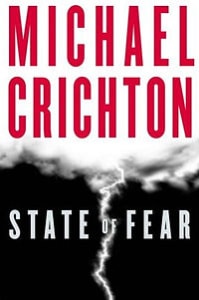 What happens when an author wants to deliver a moral and not a story
What happens when an author wants to deliver a moral and not a story
Author: Michael Crichton
Starting with assassinations and science, Michael Crichton’s 2009 bestseller, State of Fear, promises a dilemma between hard facts and what-if scenarios implemented by ecological terrorists. NERF (National Environment Resource Fund), a mega-conglomerate environmental agency, is raising awareness for the drastic, climate altering effects of global warming, but when their uber rich sponsor, philanthropist George Morton, finds opposing scientific evidence, the structure and the funding of NERF is challenged. When George disappears in a fatal car accident, only his whiney attorney (Peter Evans) and hot assistance (Sarah Jones) are left to unravel the true mystery of what George discovered. Meanwhile, a mysterious interloper, John Kenner, and his marine like assistant, Sanjon Thapa, arrive on the scene to shed some true light onto the myth of global warming and the greed of NERF.
With the entire craze for Jurassic Park of late (my personal favorite Crichton novel), I longed for his vision, his science, and the crazy tension of his worse-case driven worlds. I was also out of audiobooks for my daily two hour commute. The library only had one Crichton book that I hadn’t already read and that was the one I had been avoiding. State of Fear has always sounded a bit kitschy to me. How is the slow and highly debatable subject of global warming going to compare to Crichton’s genetically engineered dinosaurs, his rampant nanoparticles transforming the world into grey goo, or the more subtle underwater mystery of a sphere with exceptional properties? Add to this “eh” sort of reaction the hotly debated reviews of State of Fear, which seems to cause either love or hate, and the outrage of the science community when it was published, and you have a dubious recipe. I got the audiobook anyway. It’s Crichton. I have to read and judge for myself.
The novel began well enough, with a mysterious lady and comrade offing scientists and seemingly random figures at exotic recesses across the globe. Perhaps, after all, I was wrong about this novel. But, once the initial drama was over, the story sank into stupor with the typical cardboard cutout characters Crichton tends to choose. Science and tension have always been his strong points with characters being thrown in as a formula to support the plot. State of Fear, however, seems to exacerbate this problem as each character becomes an obvious mouthpiece: the concerned and smart (yet evidentially brain washed) citizen who askes all the necessary questions to get an info dump properly started, the braying voice of industry, the sanguine voice of science, and the villainous voice of funding (aka, evil villain Drake and company). The stilted dialogue ups the condescension of the story which is more interested in delivering a viewpoint and unveiling a conspiracy theory than in keeping readers entertained and reality at least somewhat in check.
Kenner, a hypothesized stand in for the author himself, sickens readers with his superiority and talking-down lectures to the drooling, gullible public. Personally, to step outside my reviewing self for a moment, I’ve always found global warming to ring more as an alarmist fairy tale and so was somewhat inclined to accept Crichton’s proposition that the theory was actually fantasy. It’s the delivery that got me so, frankly, pissed off. There’s a jaunty superiority, a condescension to the writing and a complete lack of logic. The story is trying so hard to be a moral that it ceases to be cohesive and instead turns into a rant sans editing.
*Next Paragraph Contains Major Spoilers*
The ridiculous nature of the premise proves my point. Ostensibly, NERF is implementing questionable science to cause catastrophic weather events to coincide with their global warming conference. This ecoterrorism will boost public interest and belief in the promise, and NERF will get the funding they need. Yes, yes. It’s all about funding . . . even though the science and planned events would cost untold millions . . . but let’s not logic that out.
*End of Major Spoilers*
In the conclusion, the self-conscious narrative decides to add in a poorly explained resurrection, an island with cannibals (I really have no idea), and a tsunami scheme that has so many logic flaws if manufactured in solid form it would make the perfect sieve. And then . . . it just, sort of ends. There are no explanations, no “and this happened to the villains” and “this happened to the good guys” either. The story simply runs out of energy and is then over.
The only redeeming, or should I say somewhat intriguing feature, is the concluding essay provided by Crichton where he discusses Eugenics and its history as related to global warming propaganda. The essay is well written and interesting. It says all it needs to about Crichton’s position and why he holds it. Now if I could just understand why on earth he then felt compelled to write a 300 odd page novel . . . Not recommended.
*Note on the Edition* I listened to the unabridged audio book edition of State of Fear read by George Wilson. This was a peculiar audiobook in that this was the only time that the narrator’s obviously upset, growling stomach made a pretty consistent appearance. I only noticed this when listening to head phones, but it was distinct and distracting. Wilson attempts to read well by injecting feeling into the narrative but the dialogue and story itself provided no emotions, making the audio version necessarily dry.
– Frances Carden



Leave A Comment